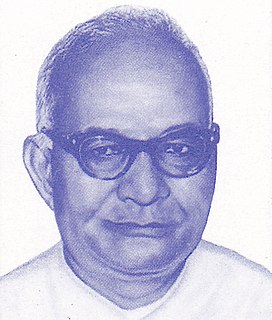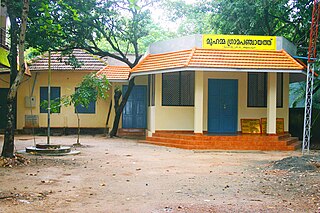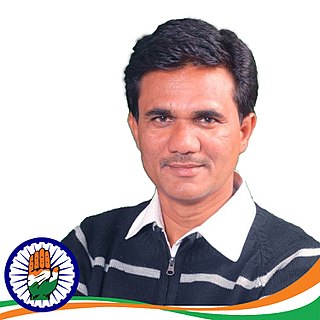
Balwantrai Mehta was an Indian politician who served as the second Chief Minister of Gujarat state, India. He participated in Indian independence movement and later held various public offices. He is considered as the 'Architect of Panchayati Raj ' due to his contributions towards democratic decentralisation.
The Government of Karnataka is a democratically elected body with the governor as the ceremonial head. The governor who is appointed for five years appoints the chief minister and on the advice of the chief minister appoints his council of ministers. Even though the governor remains the ceremonial head of the state, the day-to-day running of the government is taken care of by the chief minister and his council of ministers in whom a great amount of legislative powers are vested.
A sarpanch or Gram Pradhan or Mukhiya is a decision-maker, elected by the village-level constitutional body of local self-government called the Gram Sabha in India. The Sarpanch, together with other elected panchayat members, constitute gram panchayats and zilla panchayats. The sarpanch is the focal point of contact between government officers and the village community and retains power for five years.
Panchayat samiti is a rural local government (panchayat) body at the intermediate tehsil (taluka/mandal) level in India. It works for the villages of the tehsil that together are called a development block. It has been said to be the "panchayat of panchayats".

Panchayati Raj is the system of local self-government of villages in rural India as opposed to urban and suburban municipalities.

Kattevaram is an area of the Tenali in Guntur district of the Indian state of Andhra Pradesh. It is located in Tenali mandal of Tenali revenue division. It forms a part of Andhra Pradesh Capital Region.
Kerala is a state on the southwestern coast of India. Kerala, with appreciative development indicators comparable to developed countries, has been experimenting with decentralization and participatory local democracy, ultimately aimed at realization of the constitutional goal of establishing genuine "institutions of local self government" since the enactment of Kerala Panchayat Raj Act & The Kerala Municipality Act in the year 1994.
Municipal or local governance refers to the third tier of governance in India, at the level of the municipality or urban local body.
A tehsil is a local unit of administrative division in some countries of the Indian subcontinent that is usually translated to "township". It is a subdistrict of the area within a district including the designated city, town, hamlet, or other populated place that serves as its administrative centre, with possible additional towns, and usually a number of villages. The terms in India have replaced earlier geographical terms, such as pargana (pergunnah) and thana.
Local government in India refers to governmental jurisdictions below the level of the state. India is a federal republic with three spheres of government: central, state and local. The 73rd and 74th constitutional amendments give recognition and protection to local governments and in addition each state has its own local government legislation. Since 1992, local government in India takes place in two very distinct forms. Urban localities, covered in the 74th amendment to the Constitution, have Nagar Palika but derive their powers from the individual state governments, while the powers of rural localities have been formalized under the panchayati raj system, under the 73rd amendment to the Constitution.
In December 1977, the Janata Government appointed a committee on Panchayati Raj institutions under the chairmanship of Ashoka Mehta. The committee submitted its report in August 1978 and made 132 recommendations to revive and strengthen the declining Panchayati Raj system in the country. As a result of this report, the Indian states of Karnataka, Andhra Pradesh, and West Bengal passed new legislation. However, the flow of politics at the state level did not allow the institutions to develop their own political dynamics.

An upazila nirbahi officer is the chief executive officer of an upazila (subdistrict) and a mid-level officer of the Bangladesh Civil Service, known as Bangladesh Administrative Service. A senior assistant secretary is usually assigned to this post.
The Zila Panchayat or District Development Council or Mandal Parishad or District Panchayat is the third tier of the Panchayati Raj system and functions at the district levels in all states. A Zila Parishad is an elected body. Block Pramukh of Block Panchayat are also represented in Zila Parishad. The members of the State Legislature and the members of the Parliament of India are members of the Zila Parishad. The Zila parishad is the top most tier of the panchayat raj system and acts as the link between the state government and the village-level Gram Panchayat.
On 15 July 2014 elections to local bodies were held in the Indian state of Tripura. The Tripura State Election Commission announced the election date on 28 April 2014. This was the fifth panchayat election since the introduction of directly elected panchayats in Tripura in 1994. The number of eligible voters stood at 1,108,190.

The Panchayat raj is a political system, originating from the Indian subcontinent, found mainly in India, Pakistan, Bangladesh, Sri Lanka, and Nepal. It is the oldest system of local government in the Indian subcontinent, and historical mentions date to the 250 CE period. The word raj means "rule" and panchayat means "assembly" (ayat) of five (panch). Traditionally, Panchayats consisted of wise and respected elders chosen and accepted by the local community. These assemblies settled disputes between both individuals and villages. However, there were varying forms of such assemblies.
Block Pramukh (president) are Panchayats at the Apex or District Level in Panchayat Raj Institutions.
Babanrao Dhakne was a member of the 9th Lok Sabha of India. He represented the Beed constituency of Maharashtra and was a member of the Janata Dal. He served as the union state minister for energy resources in the cabinet of Prime Minister Chandra Shekhar. He had also held various positions in the Government of Maharashtra for several times. Babanrao Dhakne also participated in the Goa Liberation Movement earlier. His elder son died of heart attack in 2005 where as the younger son Mr. Pratap Kaka Dhakne is active in politics. His Daughter in Law Mrs. Prabhavatikaki Dhakne is the Member of Ahmednagar Zilla Parishad. His sister's grandson Mr. Subhash Kekan is currently Panchayat Samiti Sadasya, Pathardi, Ahmednagar, Maharashtra. He now has retired from Public life and currently resides in Pune, Maharashtra. He is considered as a prominent leader of the Vanjari Community of Maharashtra.

Harshawardhan Liladhar Nikose is an Indian politician member of Indian National Congress party and active mainly in Nagpur, Maharashtra region. He is state convener of Rajiv Gandhi Panchayat Raj Sanghatan and President of Indian national Congress Party, Nagpur district. having held previous offices of Chairman of Social Welfare committee, Zilla Parishad Nagpur (2007–10) and Sarpanch of Dorli village (2001-2005) in Parseoni Taluka of Nagpur District. Harshawardhan Nikose has appointed president of Vidarbha region, Rajiv Gandhi Panchayati Raj Sangathan in December 2018. New opportunity by All India Congress committee scheduled caste Dept as a Parliament co-ordinator of ramtek- 09 Parliament election 2019 under leadership development missions in reserve constituency.
Rajasthan State Election Commission is an autonomous and statutory body constituted in Indian state of Rajasthan for ensuring that elections in are conducted in free, fair and unbiased way. Constitution of India with provisions as per Article 243K and 243 ZA and Article 324 ensures creation and safeguarding of the powers of State Election Commissions. Rajasthan State Election Commission is responsible for conducting elections for Urban Local Bodies like Municipalities, Municipal Corporations, Panchayats and any other specified by Election Commission of India. Rajasthan State Election Commissioner is appointed by Governor of Rajasthan.




